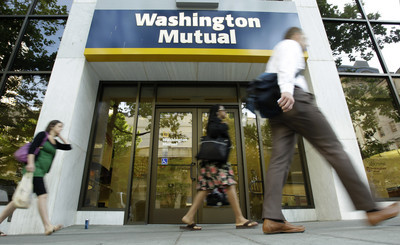Is any bank really safe now?
CHARLOTTE, N.C. -- In the nearly steady stream of bad news about banks, many consumers are likely wondering if any bank is really safe.
Those companies that did not go heavily into the subprime mortgage market are generally in better shape. But financial institutions of all sizes are nonetheless facing problems with souring debt in a weak economy, even if they haven't been hit hard like Wachovia Corp. or like IndyMac Bancorp, which was taken over by the government Friday.
Even so, earnings reports and an analyst's assessment of Wachovia on Tuesday showed that financial companies are still suffering credit losses -- and portended more bad news as more banks second-quarter results come out.
Yet analysts don't see consumers fleeing en masse from their current banks in search of safety elsewhere. IndyMac customers were lining up for their money despite government assurances it was safe, but so far, that seems to be an isolated case.
"Yes, there was a bank failure. Yes, there was a lot of people wanting to get their money. But I don't think there is any sort of distrust in our banking system," said Keefe Bruyette & Woods analyst Jefferson Harralson. "Some banks, as it is right now, are just more risky than others."
Bart Narter, senior analyst at Celent, a Boston-based financial research and consulting firm said, "If people pull out their money in one bank, they will put it in another bank."
Wall Street, however, is considerably more anxious, and it continued pummeling bank stocks Monday after a run on IndyMac led to its becoming the largest regulated thrift to fail. Shares of U.S. banks and financial companies also swooned on concern over the government's plan to shore up mortgage financiers Fannie Mae and Freddie Mac.
Some bank stocks recovered ground Tuesday as investors calmed down somewhat, but there was still uneasiness in the market as investors wondered whether more banks, particularly regional banks, might be in jeopardy due to soured credit bets.
Analysts have cited certain banks, including Washington Mutual and National City Corp., as being in trouble because of their exposure to failed mortgages.
Tuesday's bank earnings reports showed that banks are still contending with bad debt. First Horizon National Corp. said it swung to a second-quarter loss as the Memphis, Tenn.-based bank set aside more provisions to cover bad loans. Its shares rallied more than 16 percent after the results, however, to $5.87 in trading.
U.S. Bancorp posted an 18 percent drop in second-quarter profit as it tripled its provision for credit losses. The Minneapolis-based bank, which has avoided many of the mortgage and credit-related problems of some of its peers, saw its shares move down 2.7 percent to $22.70.
But an analyst downgraded Wachovia early Tuesday, and said the outlook for the Charlotte-based bank's shareholders is "bleak." Oppenheimer Co. analyst Meredith Whitney added that the bank's mortgage portfolio will continue to lose value, "seriously jeopardizing" the company's ability to generate earnings.
Wachovia spokeswoman Christy Phillips-Brown responded by saying the bank "is a fundamentally strong and stable company on solid footing."
FIRST NATIONAL SEEKS FUNDING First National Bank Holding Co., a $4.6 billion financial company with operations in Nevada and Arizona, is seeking to raise $200 million in additional capital from private equity firms but says that's not an easy task now. "The financial markets are in a bit of turmoil these days," explained Joel Gottesman, executive vice president and chief administrative officer. "There's just a lot of not very good news about financial institutions and financial markets." Federal regulators on Friday seized IndyMac Bancorp, a $32 billion asset holding company based in Pasadena, Calif., and the federal government on Sunday revealed a plan to prop up Fannie Mae and Freddie Mac, two publicly held but government-sponsored enterprises. Publicly held banks have already tapped investors for additional capital in recent months, Gottesman said, and these investors have seen poor results. That makes it that much harder for First National to raise money, he said. Investors "would like to get some better visibility as to where the bottom is (for banks)," Gottesman said. The $200 million in additional investments, which could come in the form of preferred stock, would be added to $230 million in existing capital, he said. The Lamb family would like to retain stock ownership in the bank holding company, he said. JOHN G. EDWARDS / REVIEW-JOURNAL

















